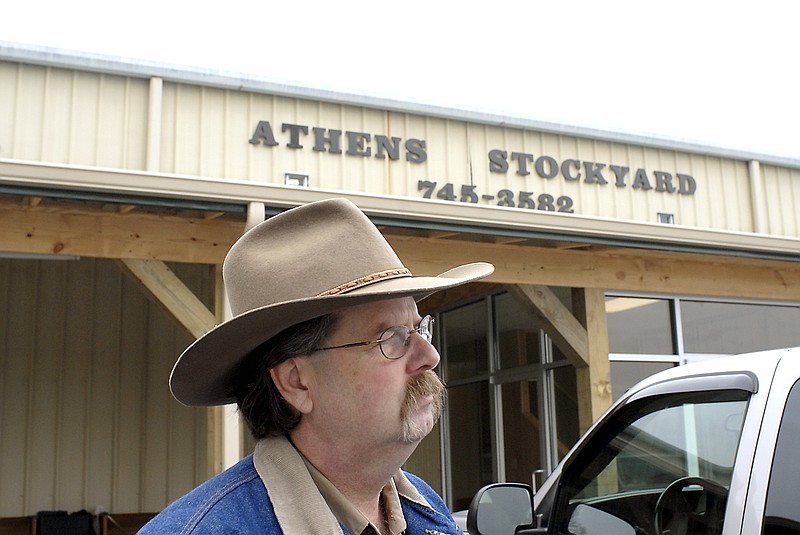"Andalé! Andalé!" someone screams in the back of the Athens Stockyard.
The pounding of hoofs rattles the arena as cattle roar through a wooden chute and into the dirt-floor showroom. A man in muddy overalls looks over the livestock and writes down a grade for each.
Sent down from McMinn County Extension, Tim Woods, an 18-year agricultural agent, stands in a corner, watching over the cattle sale with intensity, waiting for the inevitable questions from farmers.
"They want to know why their cattle got a certain grade. They want to know how to make their cattle better," said Mr. Woods, who speaks in a thick drawl and wears a handlebar mustache and cowboy hat. "I may see 20 or 30 farmers out here today ... We do anything we can to help them improve."
But Mr. Woods, director of McMinn County UT Extension, knows his advice will be spread thin in years to come.
With a $10 million budget reduction on the table, the UT Institute of Agriculture, which oversees the state's century-old agricultural outreach program, has encouraged hundreds of experienced agents to take early retirement. One state 4-H Center in Memphis has been closed, and other services could be at risk because of budget cutbacks.
Agents such as Mr. Woods are left to face a mountain of work and community needs and are straining to balance them with fewer resources. Monroe County's agricultural agents left last year for early retirement, and Mr. Woods has helped pick up the slack with farmers and homeowners in that county for more than a year.
McMinn County alone has 1,204 farms, a total of 127,502 acres of farm land. The county has more dairy cows -- 4,800 -- than anywhere else in the state.
"Right now, how it is affecting us is we don't have anyone to talk with agriculture clientele," said Greg Austin, extension director of Monroe County. "We have beef cattle and dairy farmers. We have hundreds on the mailing list. We try to help people as much as we can, but it is in nobody's specialty to be qualified to answer some of those questions."
Forty-one extension employees left their counties in 2009 when retirement incentives were offered, leaving 276 agents statewide. Another round of retirements this year may take another 20 to 25 employees out of the field.
Most of the retirees had an average of more than 32 years of experience. Some have returned on a part-time basis for a short period of time, officials said. Extension offices are looking to county government for increasing financial support.
UT officials said they are doing everything they can to keep extension from moving out of the counties and into regional offices.
"We will hang onto that the best we can," said Tim Cross, dean of UT extension. "I worry about the future of extension. We are concerned about it going from a top-notch solid program to one that has major gaps or shortcomings. As we lose a lot of people, we can't do everything we before."
Since UT officials began debating the draconian budget cuts -- now estimated at $110 million -- lined up for 2012 when federal stimulus funds run out, administrators have said UT may be forced to abandon some community outreach projects to protect its classroom mission.
Still, some say the University of Tennessee, the state's land-grant institution and agricultural resource center, can't leave Tennessee farmers, a shrinking but still sizable population, to fend for themselves.
"Many, many producers depend on extension to solve problems," said Jim Tollett, a cattle farmer in Dayton who helps run Athens Stockyard. "It is most of what farmers rely on for education. Extension is the link between producers and consumers."
In 2009, extension agents had 4.6 million face-to-face contacts with homeowners, farmers, growers and students in 4-H programs statewide, documents show. More than 397,000 of those contacts were with farmers, 2 million were with students participating in 4-H programs and 600,000 were through programs for food-stamp recipients.
The total number was a decrease from 5 million contacts in 2008, record show. The numbers have fallen with fewer agents in the field, Dr. Cross said.
Mr. Tollett said extension agents spearheaded the initiative in Tennessee for the tag and identification system for cattle after the breakout of mad cow disease several years ago. Agents also have been instrumental in ensuring the quality of produce such as beef and milk.
"They tell us to keep a record of antibiotics we use, where to give our cattle shots. They cover environmental issues," he said. "If every county didn't have an agent, they couldn't serve as many people. People would drift away from practicing food safety."
What do extension agents do?
UT extension agents help farmers grow or raise their produce and increase their profits by educating producers on technology, practices and industry standards. Agents also run 4-H programs in local schools and run educational programs about healthy cooking, gardening, landscaping and financial planning.
Source: UT Institute of Agriculture
Farmer/Producer Statewide Contacts by UT Extension
2006: 487,486
2007: 380,278
2008: 358,290
2009: 510,060
Source: UT
COUNTY BREAKDOWN 2009
* Grundy County: 3 agents, 29,851 contacts
* Marion County: 2 agents, 18,381 contacts
* Sequatchie County: 2 agents, 54,656 contacts
* Bledsoe County: 3 agents, 30,561 contacts
* Bradley County: 3 agents, 51,932 contacts
* Hamilton County: 5 agents, 102,069 contacts
* McMinn County: 3 agents, 54,880 contacts
* Meigs County: 2 agents, 27,780 contacts
* Polk County: 2 agents, 28,797 contacts
* Rhea County: 3 agents, 11,308 contacts
Source: UT Institute of Agriculture
Continue reading by following these links to related stories:
Article: Tennessee higher-education officials work to keep tuition hikes below 10 percent

